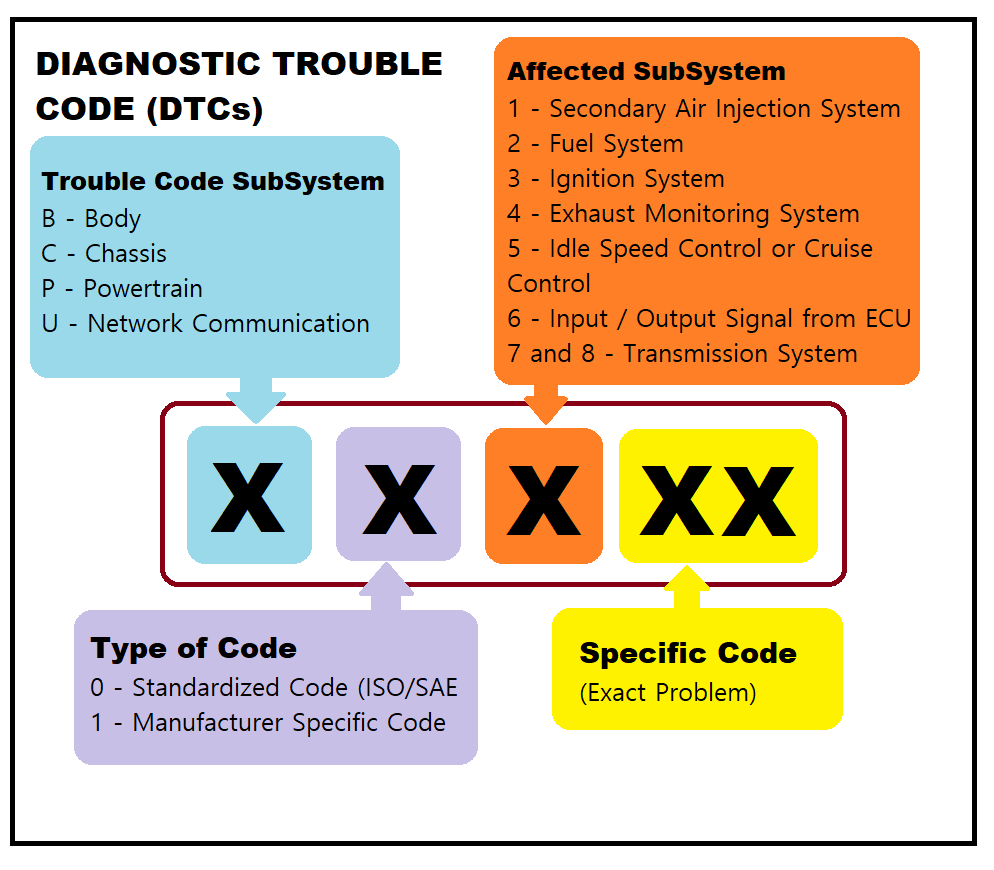What is P0500 : Engine Error code Causes Explained

This blog covers the P0500 engine trouble code, its causes, symptoms, and risks. Understanding this diagnostic trouble code helps car owners identify speed sensor faults, averting engine or transmission problems and assuring prompt repairs.
How to Identify a DTCs Number

Understand, this trouble codes (DTCs) are 5 characters: 1 letter, 4 numbers. P-Powertrain indicates the fault code’s location. Generic or manufacturer-specific codes are indicated by the first digit. The second digit denotes the subsystem (7=transmission). The last two numbers describe the issue.
To identify a DTC number like P0500, you need an OBD-II scanner or diagnostic tool connected to the vehicle’s OBD port. Once connected, the scanner communicates with the ECM and retrieves stored diagnostic trouble codes, displaying the exact DTC number along with its description, allowing you to pinpoint the issue accurately.
Causes of P0500 Error Code:

- Faulty Speed Sensor (VSS) Issues:
The VSS itself might be damaged or failing, preventing it from sending accurate speed signals. - Damaged Wiring:
Damaged or loose VSS wiring can cause signal issues. - Faulty Drive Gear.
In some cases, the drive gear that the VSS reads from could be faulty or damaged. - Open or Shorted Wiring:
A break or short in the wiring harness can block the signal to the ECM. - Bad Connections:
Loose or corroded connectors can interrupt the signal flow. - Failing Fuses:
A blown fuse related to the VSS circuit can cause the code. - ECM Or PCM Malfunction:
Rarely, a faulty ECM/PCM may misinterpret or miss the speed signal. - Power Supply Issues:
Unstable ECM/PCM power from battery, alternator, or wiring can trigger the code. - Low Transmission Fluid:
In some vehicles, low transmission fluid levels can also cause a P0500 code.
Risk Level of P0500 Error Code:

The P0500 Engine Error code, which indicates an issue with the Vehicle Speed Sensor (VSS), is considered a medium-risk level because it can affect speedometer readings and transmission shifting but typically does not immediately endanger engine operation.
Common Car Brands Affected by P0500 Code:

The P0500 code can affect various vehicles, it is most commonly associated with:
- Ford
- Nissan
- Toyota
- BMW
Video: P0500 Engine Error code
FAQ’s
What is the P0500 Engine Error Code?
P0500 indicates a Vehicle Speed Sensor (VSS) malfunction. It means the car’s computer isn’t receiving correct speed data from the sensor, affecting speedometer and transmission performance.
What Causes the P0500 Error?
This code can be triggered by a faulty speed sensor, damaged wiring, poor connections, or a malfunctioning vehicle computer. Dirt, corrosion, or mechanical damage can also interfere with sensor signals.
What is the Risk Level of P0500?
The P0500 is classified as Medium risk. While the engine may run, it can affect transmission shifting, cruise control, and speedometer accuracy, so prompt inspection is recommended to prevent further issues.
Which Vehicles are Affected by P0500?
Most modern vehicles with electronic speed sensors can display P0500. It commonly appears in cars, trucks, and SUVs across various brands including BMW, Ford, Chevrolet, Toyota, and Honda models.

